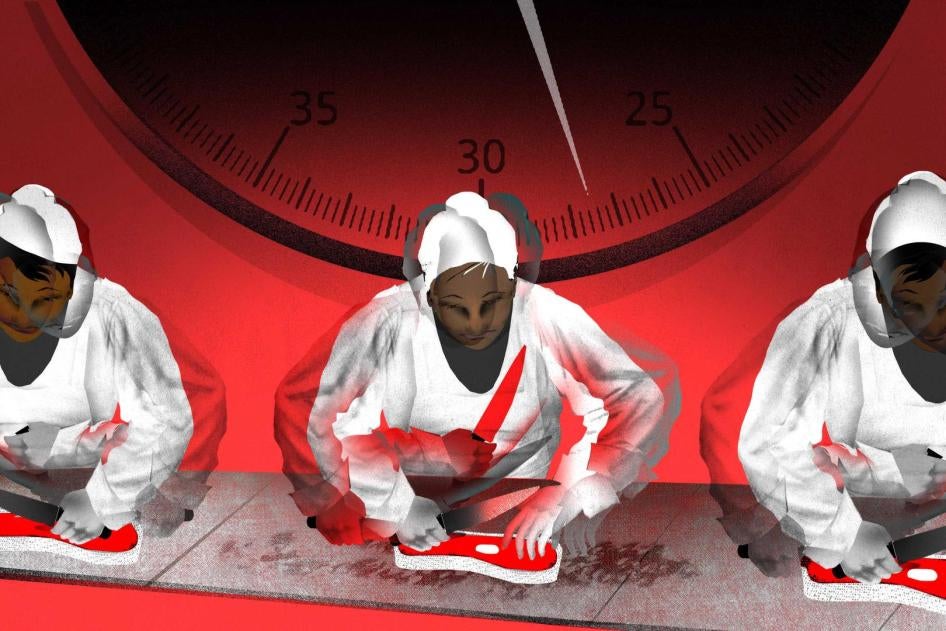Tyson Foods is carrying out a dangerous national experiment that could make their slaughter and production staff work faster, increasing the already high risk of injury to its workers. Shareholders should raise the issue on February 6th at the annual meeting in Tyson’s Arkansas headquarters. They should ask the company how it plans to protect its workers.
Tyson Foods is one of the largest poultry, beef, and pork producers in the United States, and also has one of the highest numbers of reported severe injuries in the meat and poultry industry. Meatpacking work is already dangerous, and making staff work even faster will only increase the risk.
When Human Rights Watch interviewed workers across the country about the issue last year, a worker from a Tyson Foods plant in Alabama described the throbbing pain in her hands, sometimes waking her up in the night. She believed her pain was the result of repeating the same intense motions hundreds of times a day, a common concern raised by almost all the meatpacking workers we spoke to across the poultry and meat industry. Other Tyson workers described burning eyes and breathing problems, which they believed were due to the sanitizing chemicals they were exposed to for long hours every day.
Studies have shown that the more quickly workers slaughter and process animals—known as the “line speed”—the more the risk of harm like repetitive stress injuries increases. Tyson Foods and other companies are participating in a new federal inspection program that allows some poultry processing facilities to increase their line speed. Seven Tyson plants are operating under the new inspection system. Workers that we spoke to in a Tyson plant operating under the new system said they perceived increased line speeds throughout their facilities.
We also learned that the number of employees per work station has decreased in some Tyson facilities, creating pressure for the remaining workers to work even faster. One worker told us that she hurt her back and neck because she was trying to keep up with all the chicken breasts coming down the line soon after the plant increased line speeds and removed two of four workers in her area. She said the company asked her if her injuries could have been prevented. She told us, “When you removed a person from each side … and then upped the line speed—yes, hurting myself could have been prevented.… That’s too much work for one person to do all day.”
The Trump administration has gone further with pork producers and has eliminated line speed regulations altogether. They are considering the same for beef producers, too, according to the advocacy organization Food and Water Watch. We are concerned that easing or eliminating line speed regulations will significantly increase the risk of serious injury for workers across Tyson Foods’ operations, as well as in other companies.
Tyson Foods says it supports principles of human rights and workers’ rights and should live up to these words. Shareholders should ask the company for greater transparency on how they are protecting workers from harm and protecting their rights. They should also be asking about the company’s processes to identify and address rights risks and impacts, also known as human rights due diligence, across Tyson Food’s operations and supply chain.
The company should be consulting workers who are the most affected by their policies and making the findings public. An assessment of the effectiveness of their human rights policies and practices, such as what they do for the workers when harm does occur, would provide shareholders with a greater understanding of whether the company’s approach is impactful.
Tyson shareholders will have the opportunity at the annual meeting to vote on a resolution that promotes transparency in their human rights practices. They should use this opportunity to protect workers and push the company to take more meaningful action on human rights.








